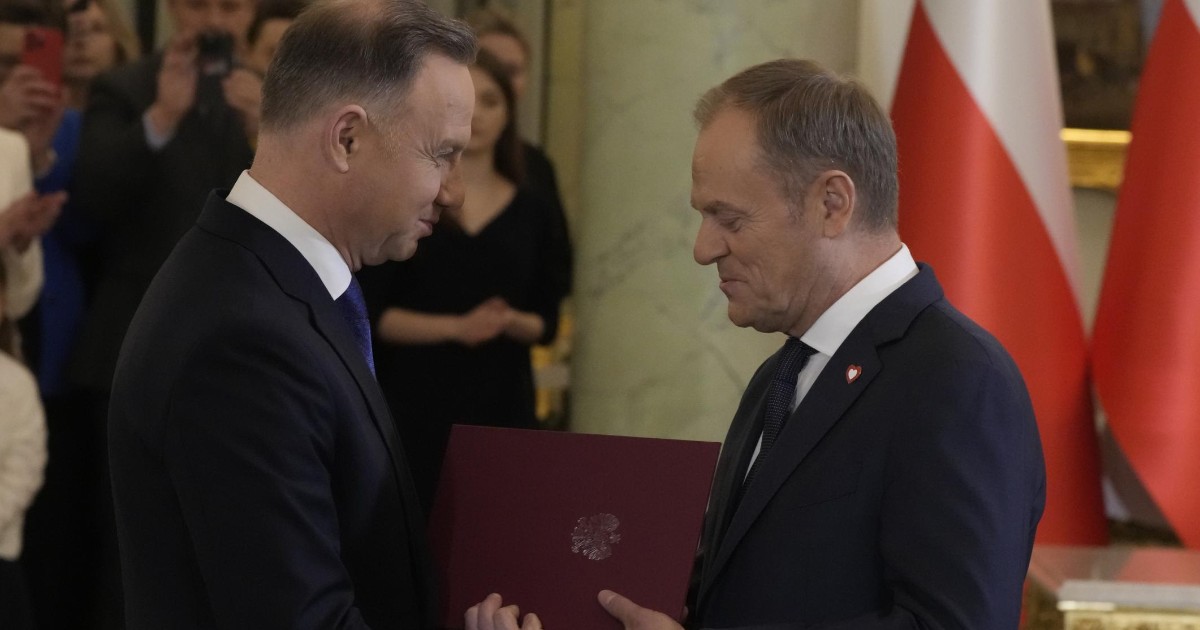The clash between the Polish government led by the prime minister Donald Tusk and the President of the Republic Andrzej Duda has now passed the point of no return. This is demonstrated by the affair involving the deputies Mariusz Kaminski e Maciej Wasiktwo members of the party Law and Justice sentenced to two years in prison for corruption and took refuge in the presidential palace for escape arrest (which later happened anyway). Duda, who had already pardoned the two parliamentarians in the past, announced that he would re-propose the proceedings and stated that, as reported by theAnsathe two are “political prisoners”. In the same hours, tens of thousands of people took to the streets of Warsaw to protest against the reform program wanted by the executive.
Read Also
The Polish police are looking for two convicted politicians to arrest them, but cannot find them: they were in President Duda’s office
The events take place in a climate of strong contrast which sees the party on one side Law and Justiceanti-European and radical right, in the same grouping as Brothers of Italy to the European Parliament, which had to leave power ten years after the defeat in the October elections and on the other the centrist and pro-European executive of Tusk (a leading exponent of the European People’s Party), determined to reform the apparatus Polish state government to nullify any influence from the previous government. Tusk has already fired the heads of the main public media, appointed by the ultra-conservatives, a move described by some as controversial and aimed at strengthening “hold on institutions“. The new prime minister also replaced the people at the head of the secret services and security, accused of having spied on the now former opposition.
The main obstacle to Tusk’s actions, however, is represented by the head of state Duda, re-elected in 2020 and in office until mid-2025. The Polish president enjoys significant constitutional powers and among these stands out the possibility of veto on any law that does not receive the approval of at least sixty percent of parliamentarians. The Tusk government, formed by a coalition of centrists from Civic Coalitionthe liberals of Third Way and the left of Left, does not have this percentage of seats and has the support of just under 250 parliamentarians out of the 460 in the Polish Parliament. Duda has already vetoed the budget and announced that he will send “his own version” of the state budget to Parliament.
Read Also
Poland, President Duda will pardon two convicted party comrades. They avoided arrest by taking refuge in his palace
The Tusk executive, which will already have to find a synthesis between the parties that form it to overcome any internal problems, seems destined to find itself in a condition of significant precariousness for at least a year and a half. Duda’s axe, which has every interest in hindering government action, can fall on any provision and end up watering down the reformist program desired by the parties in power. Peaceful coexistence risks being difficult: the choice made by Polish voters in 2023, who preferred Europeanism and moderation to radicalism and illiberalism stile Orbán of Law and Justice, was not accepted by the more conservative wing of the Polish population and left its mark on society.
The blockade situation does not seem to affect the consensus of the political forces. A recent survey, carried out between 5 and 8 January by Irbis/Onet, highlighted how United Right, the coalition led by Law and Justice, is credited with 34.2 percent of the votes against 35.3 in the elections three months ago. Civic Coalition is at 32 (against 30), Terza Via is at 17 against 14, Lewica’s left is stuck just under 9. The voters have remained faithful, except for small changes, to the preferences expressed and this may not be a good news for Warsaw given that the internal divisions, between conservatives and liberals and between cities and their companions, risk weakening Polish stability on the regional scene.
Warsaw is at the forefront of its support forUkraine and actively opposes the political line of Mosca in Europa Oriental. A weakening on the internal front, among parties that have hostility towards the Kremlin among the few things in common, could be a key for Russia to exert greater pressure on a European Union which, as often happens, is internally torn and awaits the European elections in June with trepidation. Kiev, but also the Baltic States and Brussels, have much to lose from the internal divisions in Warsaw and must hope for a possible recomposition.
